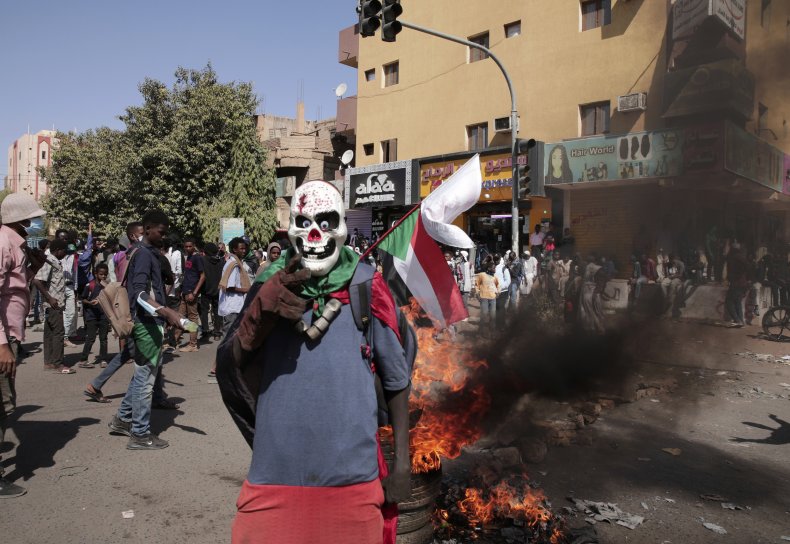The crisis in Sudan isn't stopping any time soon as people took part in an anti-coup protest on Tuesday after Prime Minister Abdalla Hamdok resigned earlier in the week.
Protests have been frequent since the October 25 coup when Hamdok was forced out of office. He was reinstated just a month later after a deal with the military to try to calm the protests, but he stepped down Sunday.
Protesters, who said authorities are trying to prevent the movement, shut down major roads in the capital Khartoum and Omdurman as a way to prevent them from getting to government buildings. The tactics have been used for the past two months.
Despite the roadblocks, protesters took to the streets to revolt against the coup and Hamdok's resignation. Demonstrators were seen waving the Sudanese flag, singing and beating drums.
Other pictures showed small fires set to stacks of tires and the ground littered with trash. Some protesters were seen wearing costume-like masks.
Authorities used tear gas to disperse crowds in several areas around the capital, including near the presidential palace. Videos showed people throwing stones and tear gas canisters back at authorities.
Nearly 60 protesters have died since the beginning of the coup and hundreds have been injured, according to a Sudanese medical group.

Sudan has been politically paralyzed since the coup. The military takeover came more than two years after a popular uprising forced the removal of longtime autocrat Omar al-Bashir and his Islamist government in April of 2019.
The military, under international pressure, reinstated Hamdok in November to lead a technocratic Cabinet. But the deal sidelined the pro-democracy movement behind the uprising against al-Bashir. Since then, Hamdok was unable to form a Cabinet amid relentless protests not only against the coup but also against his deal with the military.
The protests are called by the Sudanese Professionals' Association and the Resistance Committees, which were the backbone of the uprising against al-Bashir.
Hamdok's resignation has thrown the country into further uncertainty and "deprived the generals of the fig leaf" they used to continue their military rule, said Mohammed Yousef al-Mustafa, a spokesman for the association
The protest movement insists on a fully civilian government to lead the transition, a demand rejected by the generals who say power will be handed over only to an elected government. Elections are planned in July of 2023, in line with a constitutional document governing the transitional period.
U.N. Secretary-General Antonio Guterres called for "meaningful dialogue" between all Sudanese parties to "reach an inclusive, peaceful and lasting solution," according to U.N. spokesman Stéphane Dujarric.
Sudan's largest Umma party called for the return to the 2019 constitutional document governing the transitional period, which calls for the military to relinquish the leadership of the ruling sovereign council.
"This is the only way for the salvation of the nation, the integrity of the transitional period and the accomplishment of its tasks within the agreed-upon timeframe," the party said in a statement.
Deliberations have been underway to find "an independent figure" to lead a technocratic Cabinet through elections, according to a military official and a protest leader. They spoke on condition of anonymity to discuss the negotiations. Among names floated was that of former Finance Minister Ibrahim Elbadawi.
Elbadawi, who resigned in 2020, was not immediately available for comment.
Jibril Ibrahim, a rebel leader who joined Hamdok's government last year following a peace deal with the transitional administration, urged for a "political compromise" to resolve the crisis.
"Let us agree to work together for the sake of Sudan," tweeted Ibrahim.
Al-Mustafa, the spokesman, said the association rejects talks with the coup leaders, warning of "deadly" street confrontations between protesters and security forces. He called on the international community to pressure the Sudanese military to allow the establishing of a fully civilian government.
General Abdel-Fattah Burhan, head of the ruling Sovereign Council, said an independent Cabinet with "specific tasks" would be formed as the executive branch of the transitional government. The military, he said, would "protect the democratic transition" until Sudan is able to hold free and fair elections.
The Associated Press contributed to this report.

Post a Comment